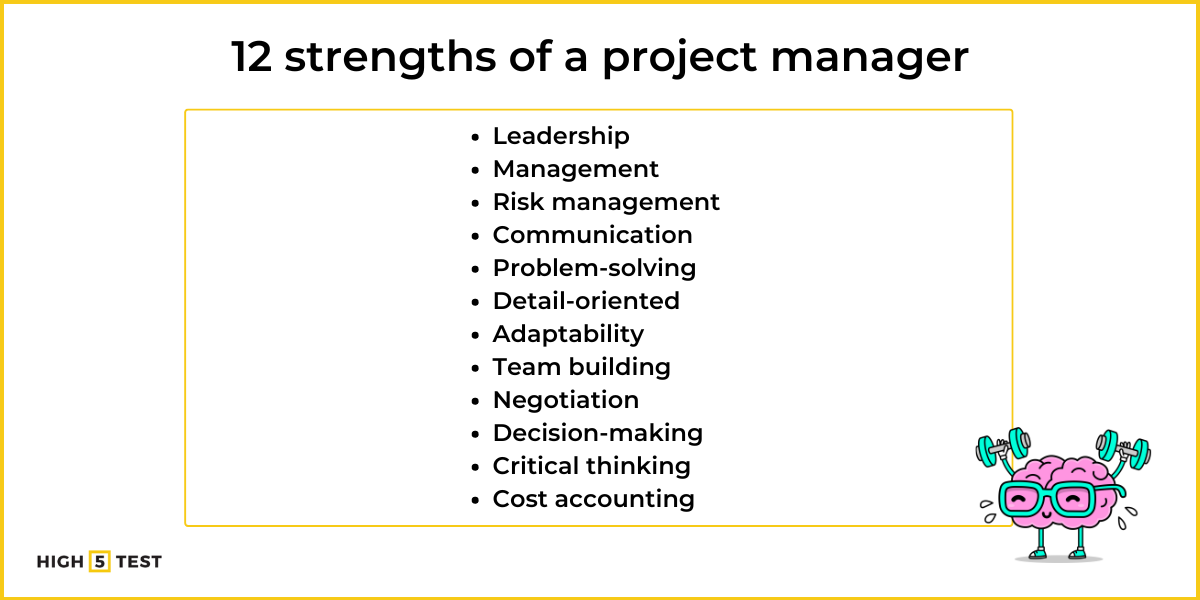Maximizing the strengths of a project manager is undoubtedly an essential skill for any organization. However, before you can leverage these strengths, it’s crucial to accurately identify them. The HIGH5 strengths assessment provides a comprehensive evaluation of an individual’s unique strengths, enabling project managers to gain a deep understanding of their natural talents and how to apply them effectively. By taking this assessment, you’ll not only be better equipped to ensure projects are completed on time, within budget, and to the required quality standards, but you’ll also gain valuable insights into your personal and professional development areas.
With complications that can arise at any stage of a project, a project manager needs to have a deep understanding of the organization they’re working with as well as the people involved. This ensures that they can quickly and effectively resolve any issues that may come up. In this article, we’ll take a look at some of the strengths of project managers that can make them successful in any organization. If you’re looking to become a project manager or are simply interested in learning more about what it takes to be successful in this role, read on!
Why are the strengths of a project manager important?
Project managers are vital because they lay the foundation for a successful project. When a project manager can effectively leverage their strengths, it not only leads to increased productivity among team members but also fosters an environment of collaboration and efficiency [1]. The HIGH5 strengths assessment provides a structured framework for project managers to identify and capitalize on their unique strengths, enabling them to approach projects with a clear understanding of their natural abilities and how to apply them most effectively. By aligning their roles and responsibilities with their innate strengths, project managers can unlock new levels of productivity, communication, and overall project success. Some of the benefits of having a strong project manager include:
- Increased productivity – when a project manager can utilize their strengths effectively, it can lead to increased productivity among team members [2].
- Improved communication – a good project manager will have excellent communication skills, which will help to keep everyone on track [2].
- Reduced stress levels – in any organization, stress is bound to be present at some level. However, project managers can help reduce stress during a project.
- Greater job satisfaction – ultimately, when a project manager can utilize their strengths and produce successful results, it can lead to greater job satisfaction. This is not only beneficial for the project manager but also for the project team and the organization as a whole [1].
- A more efficient workflow – an effective project manager will be able to create a more efficient workflow, which can save both time and money.
- Improved project planning and execution – a good project manager will have strong planning and execution skills, which are essential for any successful project [2].
- Greater team collaboration – when a project manager can utilize their strengths, it can lead to greater collaboration among team members.
Pro Tip From HIGH5
Encourage your organization to invest in the HIGH5 strengths assessment for all project managers and team members. By understanding everyone’s strengths, you can assign roles and responsibilities that align with their natural talents, leading to increased productivity, improved communication, and greater job satisfaction.
12 strengths of the project manager
The following is the list of great strengths that project managers have:
- Leadership
- Management
- Risk management
- Communication
- Problem-solving
- Detail-oriented
- Adaptability
- Team building
- Negotiation
- Decision-making
- Critical thinking
- Cost accounting

Leadership
Leadership is a pivotal strength for any project manager as it guides team members toward achieving project goals. You don’t have to have a team reporting directly to you to be considered a leader. Project managers are also leaders because they lead through thought and influence. Effective leaders inspire confidence and enthusiasm, fostering an environment where team members feel valued and motivated.
Management
Management involves coordinating and administering tasks to achieve a set of goals. This strength is crucial for project managers as it ensures that resources are allocated efficiently, schedules are adhered to, and project objectives are met.
Risk management
Risk management is identifying, assessing, and prioritizing risks followed by coordinated efforts to minimize, monitor, and control the probability or impact of unfortunate events. Effective project managers recognize potential risks early on and develop mitigation strategies to avoid project derailments, ensuring the project remains on track and within budget.
Communication
Communication is essential to ensure that all project stakeholders, from team members to clients, are informed, engaged, and motivated throughout the project lifecycle. A project manager with strong communication skills can clearly articulate project goals, updates, and changes while ensuring transparency and fostering a collaborative environment.
Problem-solving
Problem-solving involves identifying complexities and developing efficient solutions swiftly and effectively. Project managers face challenges daily, from budget constraints to resource shortages, and having robust problem-solving skills allows them to navigate these challenges without compromising the project’s success.
Detail-oriented
Being detail-oriented enables project managers to oversee every aspect of the project meticulously, from compliance with regulatory standards to adherence to client specifications. This strength is vital in managing complex projects where minor discrepancies can lead to significant issues.
Adaptability
Adaptability is the ability to adjust tactics and strategies quickly in response to changing conditions or unexpected situations. This strength is particularly important in dynamic project environments where external factors, such as market trends or technological advancements, can impact project parameters.
Team building
Team building is crucial for cultivating a strong, cohesive work environment conducive to efficient collaboration and high performance. Project managers with this strength can create balanced teams with complementary skills, foster open communication, and promote mutual respect among team members.
Negotiation
Negotiation skills enable project managers to seek win-win agreements and maintain positive relations with all stakeholders, including suppliers, clients, and team members. Effective negotiation ensures project objectives align with resource capabilities and organizational goals, enhancing project feasibility and success.
Decision-making
Decision-making is critical for selecting the best courses of action based on available information and the overall project strategy. Project managers must make timely decisions that reflect the project’s immediate needs and long-term objectives, ensuring efficient progress and alignment with client expectations.
Critical thinking
Critical thinking involves analyzing facts to comprehensively understand a problem or situation before making a decision. This strength is vital for project managers to evaluate project variables critically and anticipate potential issues before they become problematic.
Cost accounting
Cost accounting involves meticulously managing project finances, ensuring that the project remains within budget without sacrificing quality. Skilled project managers can track expenses, forecast costs, and make adjustments to deliver on financial objectives.
How to identify your strengths at the workplace as a project manager?
As a project manager, it’s important to know your strengths and weaknesses. This will help you manage projects and tasks, and identify areas in which you may need help or additional training. There are several ways to do so. One way is to take strengths assessments such as the HIGH5 test. Strengths assessments can help you understand your natural strengths and how you best function in the workplace. Another way to identify and maximize your strengths is through self-reflection. Take some time to think about what you’re good at and what makes you happy at work. What tasks do you enjoy most? What comes naturally to you?
Once you have a better understanding of your strengths, you can begin to look for opportunities to use them more often in your job. Finally, ask others for their feedback on your strengths. Colleagues, friends, and family can give you some great insights into what your strengths are. Ask them what they think makes you successful and how they would describe your strengths. Collecting feedback from others can help you see yourself in a new light and better understand what makes you unique.
Pro Tip From HIGH5
In addition to self-reflection and feedback from others, consider taking the HIGH5 strengths assessment to gain a comprehensive understanding of your unique strengths as a project manager. This scientifically validated assessment provides actionable insights into your natural talents, enabling you to develop targeted strategies for leveraging and mastering your strengths in the workplace.
How to highlight your PM strengths in a resume/CV?
When crafting a resume or CV as a project manager, it’s crucial to prominently feature your project management strengths to catch the eye of potential employers. Start by identifying key strengths that align with the job description, then use specific, quantifiable examples to demonstrate these skills in action. For instance, instead of just stating “excellent leadership skills,” you might write, “Led a team of 10 in a project that resulted in a 20% increase in efficiency and was delivered two weeks ahead of schedule.” This approach showcases your abilities and conveys the tangible benefits your leadership can bring to the organization.
How to highlight your PM strengths in a job interview?
In a job interview, it’s important to articulate your project management strengths effectively by providing specific examples from your previous experiences. Prepare brief stories demonstrating how you have successfully applied your skills to achieve project goals. For example, describe a situation where your risk management skills allowed you to address a potential issue preemptively, saving the project time and money. This method illustrates your capabilities and shows your proactive approach, and ability to translate skills into positive outcomes.
What are the weaknesses of the project manager?
Every professional has opportunities for improvement. While a project manager’s growth areas can vary depending on the individual, there are some common areas where project managers tend to struggle.
- Lack of technical knowledge
- Inability to handle conflict
- Inexperience
- Poor communication skills
- Lack of organizational skills
How to change your project management weaknesses into strengths?
Here are a few key ways to improve your project management weaknesses into strengths:
- Understand your weaknesses: As a project manager, it is important to be aware of your weaknesses and understand how they may impact your projects. If you are not confident in your abilities, it will be difficult to convince others of your capabilities. By understanding your weaknesses, you can work to improve them and become a stronger project manager.
- Acknowledge your strengths: In addition to acknowledging your weaknesses, it is also important to acknowledge your strengths. Knowing what you are good at can help you leverage your strengths and use them to your advantage when managing projects.
- Seek feedback: Seeking feedback from others can help identify both your strengths and weaknesses. By asking for input from others, you can better understand how others perceive you and what areas you may need to work on.
- Take on new challenges: Challenging yourself by taking on new tasks and responsibilities can help you improve your skills as a project manager. By pushing yourself outside of your comfort zone, you can learn new things and grow in this role.
Pro Tip From HIGH5
While it’s important to acknowledge and work on your weaknesses, remember to focus on building upon your strengths as well. The HIGH5 strengths assessment can help you identify your natural talents, allowing you to develop strategies for maximizing your strengths and using them to overcome weaknesses more effectively.
What is the greatest strength of a project manager?
There is no single answer to this question as each project manager’s strengths and qualities will vary depending on their skills and experience. However, some of the most common strengths that make a great project manager include:
- Strong organizational skills
- Excellent communication abilities
- The ability to motivate and inspire teams
What are the top qualities of a project manager?
When it comes to a project manager’s greatest qualities, no two project managers are alike. But, the most common qualities that project managers are renowned for include:
- Good leadership skills
- Being able to think creatively
- Having strong decision-making abilities
- Being highly organized
References:
- Luker, A. (2011, October 5). The Benefits of Project Management for Businesses. Villanova University. https://www.villanovau.com/articles/project-management/benefits-project-management/.
- Armshaw, D. (2005). There has to be a better way than this!: How to get big benefits from project management basics. Paper presented at PMI® Global Congress 2005—EMEA, Edinburgh, Scotland. Newtown Square, PA: Project Management Institute.








